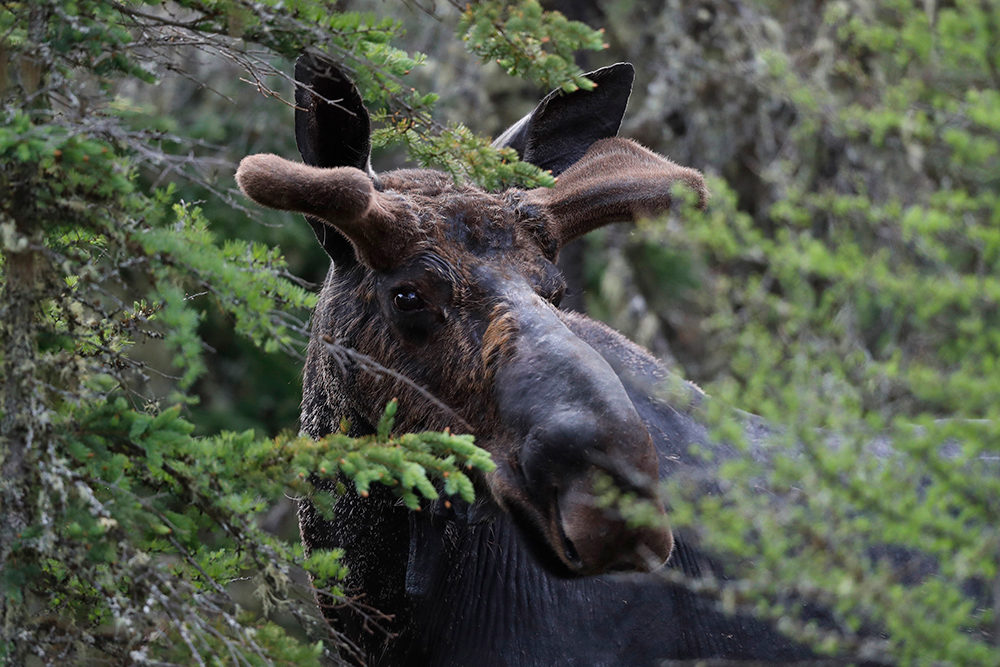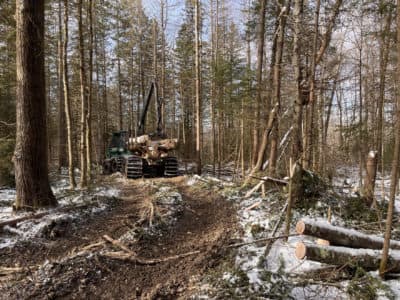Advertisement
More moose hunting this fall? Vt. biologists say it will combat winter ticks

More hunters could be out in the woods searching for moose in Vermont this fall. Biologists at the Department of Fish and Wildlife recently recommended the state issue 180 moose hunting permits, up from 100 last year in an area where about 1,000 moose reside.
That’s in an effort to reduce the spread of winter ticks, a parasite that plagues moose throughout the Northeast.
The ticks are the driving force behind declining moose birth rates, and why only about half of calves in Vermont survive their first winter, according to recent state-sponsored research. It’s a problem that’s intensified as the region’s winters have grown warmer and shorter.
“If we could get rid of winter ticks, our moose would be very healthy,” said Nick Fortin, a wildlife biologist with the state. “They have a phenomenal habitat. They just have too many parasites right now.”
Killing moose to keep the population healthy is a counterintuitive idea, and one that wildlife managers often get pushback against.
“You see less moose, you hear that moose are dying from ticks. And then the state’s response is, ‘We’re going to increase permits,’” said Lee Kantar, a biologist with Maine’s Department of Inland Fisheries and Wildlife. “That’s a very bitter pill for somebody to swallow.”
"You see less moose, you hear that moose are dying from ticks. And then the state’s response is, ‘We’re going to increase permits.' That’s a very bitter pill for somebody to swallow."
Lee Kantar, Maine Department of Inland Fisheries and Wildlife
In Maine, moose face the same issues with winter ticks. There, managers have a much larger population of moose to contend with — upwards of 70,000 animals, spread across tens of thousands of acres. Kantar says because of that scale, hunting is the only viable tool they have.
Sarah Hoy, a wildlife biologist at Michigan Tech, says that doesn’t mean it’s a good option.
“Recreational hunting is typically not a very effective method of limiting the spread of diseases within those populations,” she told Vermont Public last year.
“You're killing a lot of individuals that could have easily survived,” she said. “Not all of them are going to be carrying high numbers of these parasites that you're trying to get rid of.”
There are ways to tweak hunting regulations to target moose that are loaded with ticks, Hoy said. Like if you hunt in the spring, you can see if moose have ripped out their hair trying to get relief from the ticks.
Where Hoy studies moose, an island in the middle of Lake Michigan, there are also wolves, which prey on sick animals. New England doesn't have that option to keep the moose population in check.

“Our moose have no major predators,” said Nick Fortin, the wildlife biologist with Vermont's Fish and Wildlife Department. “The only thing that’s killing them is either diseases and parasites or humans, whether we do that with our cars or with guns.”
Right now, it’s only winter ticks that are killing moose in meaningful numbers, not hunting.
And in Vermont, even with the proposed increase in hunting permits, it will still take seven or eight years of sustained hunting pressure to get the moose population down to the state’s target.
“Honestly from our perspective, anything slower than that, or would take longer than that, is not responsible management, because we’re prolonging this issue,” Fortin said.
Public comment on the department’s proposal is open through the end of March. The Fish and Wildlife Board will decide whether to OK more hunting in the first week of April.
“We want to get there,” Fortin said. “We want to get our moose healthy.”
This story is a production of the New England News Collaborative. It was originally published by Vermont Public.